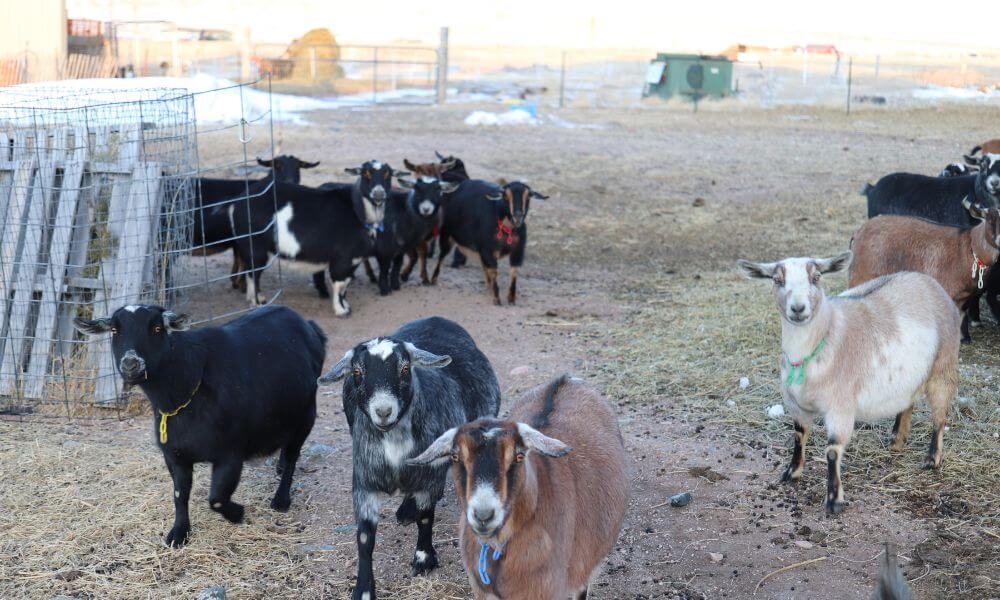Breeding goats is not something that you can learn to do overnight.
There are a lot of things you need to know in order to do it successfully, and things can always go wrong even with the most veteran breeders.
One common problem is that the doe will not come into heat, and you have trouble getting them to even breed in the first place.
This can be very frustrating, and it’s hard to know exactly what’s causing it or how to help.
Whatever reason you want to breed your goats, the last thing you want is your goat’s estrus cycle to come around and for her then not to be able to breed.
Today, we’re going to look at some of the most common reasons your goat isn’t coming into heat—and what you can do about each of them.
Let’s get started.

Mineral deficiency
One very common problem in a domestic goat’s life is that it doesn’t get the minerals that it needs.
Copper, selenium, phosphorous—all of these are totally essential to a goat’s diet, and they can have a big impact on their heat cycle if any of them are lacking.
Many goat owners use mineral supplements in addition to their goat’s diet, if they don’t have access to the minerals.
Copper particularly is very often a problem, so try and figure out how much copper your goat is getting from the foods it eats.
If it isn’t enough, introduce some supplements.
Vitamin deficiency
Vitamin deficiencies can also be a very common problem, which will affect heat cycles.
Just like us, goats need a wide range of vitamins in their diet for a wide range of functions, including the heat and reproductive cycle.
Naturally, this again comes down to a question of diet.
Fruits and vegetables are a great source of many essential vitamins, like A, B6 and B12, C, and D.
If there isn’t enough of any of these in your goat’s diet, it could well affect their heat cycle.
Again, supplements are also an option.
Hormone imbalance
A combination of things can lead to a hormonal imbalance in your goat, too.
Since the estrus cycle is essentially driven by hormones, if there isn’t a sufficient amount, then they may not go into heat as normal.
For a goat that has been healthily in heat before, a hormone imbalance is likely the result, again, of dietary deficiencies.
There may be other reasons, but it always starts with their diet, and that’s what you should first check.
Hormone supplements should only be administered after careful consultation with a vet.
But always consider the possibility of a hormone imbalance.
| Related Articles |
|---|
Physical defect
If you’ve eliminated the above possibilities, you should consider the possibility of a physical defect affecting its ability to go into heat.
Check the goat’s genitals for anything that seems to be amiss or not as it should be.
There are many common physical birth defects affecting a goat’s heat cycle.
A genital defect can again mean hormone imbalances which prevent or severely weaken the heat cycle.
If you’re unsure of what to look for yourself, refer to a visual aid or, again, consult with a vet.
Goat could be sterile
Even if there is no physical defect, there is still always the possibility that your goat is sterile.
This means both that they cannot have kids and that they will never go into heat in the first place.
Again, many things can cause sterility in goats.
They may be born that way—this is very common. If they are not born sterile, a freak occurrence at any time in their life could cause them to become sterile.
Vets can perform tests to check the goat’s fertility, and depending on the root cause, there may be treatments.
It’s very difficult to say with any certainty, though.
Goat has an illness
If your goat is in any way ill, this could also lead to severely lacking or weakened heat cycles.
This is obviously a very broad category, but you should look for things like slower movement, depression, lack of appetite—any of these things could indicate illness.
If your goat is ill, it isn’t going to come into heat cycle in the ordinary way, and it could in any case cause complications in pregnancy.
The age of the goat
Finally, though you may not want to contemplate it if you’ve had many years with the goat, it may just be getting too old to breed anymore.
This varies a lot between goats, and some go on breeding for many years longer than others.
In any case, there may be nothing wrong with your goat other than that it is simply in the twilight of its life.
This will depend on the breed, too, since some are bred to be able to go on breeding for longer periods.
Once again, if you’re unsure, a vet can help you out.
So, the short answer is that there is no short answer.
Goat health is complex and can be difficult to understand for those of us who are not vets.
For you, as the owner, a lot of it starts with diet and daily care.
Many deficiencies in a goat’s health could lead to weak heat cycles, or could eliminate them entirely.
The first thing to do is make sure that you are providing the best balance of diet and exercise for your goat.
Once you’re sure it’s nothing this basic, your best bet is to consult a vet.
This will give you your best shot at identifying and treating the problem.
